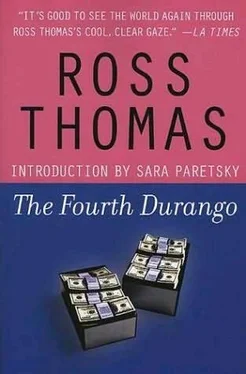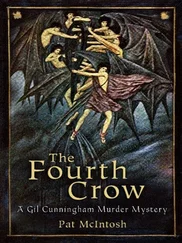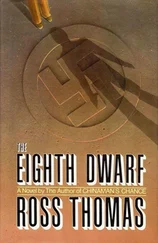Vines left the living room, crossed the hall and entered the dining room. Justice Fuller sat in an armchair. It matched the dining table that was made from some very dark, almost black wood, possibly Philippine mahogany. The table was part of a suite composed of eight matching chairs, a carved sideboard and a glass-fronted china cabinet.
Seven of the eight chairs were drawn up to the long table. The one Justice Fuller sat in had been shoved back three feet from the head of the table, almost to the wall, apparently to keep blood from splattering the one-page handwritten letter that lay on the table just in front of two open shoeboxes that were filled with packets of one-hundred-dollar bills, each packet bound by a red rubber band.
Justice Fuller sat sprawled in the armchair, his head thrown back. An inch or so above the bridge of his nose was a black hole whose diameter was about that of a pencil. On the floor beside the chair was a small semiautomatic pistol.
Vines stared at the dead supreme court justice for either seconds or minutes, he could never remember which, then turned to read the handwritten letter. It lay centered on the table and anchored by a full lower set of dentures that served as a paperweight.
Using a ballpoint pen to push the false teeth aside, Vines read the looping handwriting of the to-whom-it-may-concern letter:
After receiving a disturbing call this morning from the state attorney general’s office, I have decided to end my life and also that of my incurably ill and much beloved Martha.
The reason for these drastic measures is that Chief Justice Jack Adair and I each accepted a $500,000 (five hundred thousand dollars) bribe from a party or parties unknown to vote as we did on the Jack and Jill Jimson appeal. It was Chief Justice Adair, heretofore one of the most honorable men I have ever known, who, fully cognizant of my precarious financial condition, approached me with the offer to divide $1,000,000 (one million dollars) in bribe money evenly. But now the burden has simply grown too great and Martha and I have grown too old. I am dreadfully sorry.
The letter was signed, “Sincerely, Mark Tyson Fuller.”
Kelly Vines used his ballpoint pen to push the false teeth back to where they had been, went to the phone in the living room and called a newspaper reporter he knew. He then waited exactly five minutes and called the police. The reporter, accompanied by a photographer, arrived first. The photographer, having quickly taken pictures of the dead justice, his murdered wife and the suicide note, was taking pictures of the two shoeboxes full of one-hundred-dollar bills when the police arrived.
“There were four of them,” Vines said. “Two homicide detectives and two uniforms. First, they threw out the reporter and the photographer. Next they yelled at me for a while. Then they made sure that both Justice and Mrs. Fuller were really dead. After that, they read the suicide note. And finally, they counted the money. But no matter how many times they counted it-and it was at least six or seven times-the total still came to only four hundred and ninety-seven thousand dollars.”
As Vines expected, it was Parvis Mansur who asked the first and most pertinentquestion. “Were two enough?”
“Two shoeboxes? Yes.”
“Is that an estimate-a guess?”
“Neither.”
“May I ask how you knew?”
“From some ex-clients who carried large chunks of cash around in shoeboxes.”
“How much American money will fit into one?”
“In hundreds?”
“Yes. In hundreds.”
“The average shoebox is twelve inches long, six inches wide, three and a quarter inches deep and can hold up to three thousand U.S. bills, if they’re tightly packed. But the people I knew didn’t pack more than twenty-five hundred bills into one. By using hundred-dollar bills, they had a convenient, portable container that held a quarter of a million dollars and weighed only five point one pounds.”
“How do you know how much it weighed?” B. D. Huckins asked.
“Because there are four hundred and ninety U.S. bills to the pound.”
“You also learned this from your former clients?” Mansur said.
“Where else?”
“They must’ve been exceedingly prosperous.”
“They were pot smokers who became dealers, grew into major wholesalers and eventually took in so much cash they had to weigh it to count it.”
“What happened to them?” Dixie Mansur asked.
“Who cares?”
“Let’s return to the reporter and the photographer,” Mansur said. “As soon as you read the suicide note and looked at the two shoeboxes, you realized they could, in fact, contain no more than half a million dollars, right?”
“Right.”
“So to preserve everything on film before the police arrived, you called the reporter and urged him to bring a photographer along. Also true?”
Vines nodded and Mansur nodded back contentedly. The silence that followed was finally broken by B. D. Huckins with an exasperated sigh. “I don’t understand.”
“Don’t understand what?” Vines said.
“Any of it. Especially the money thing. Was there a million or only five hundred thousand? Did the judge, what’s his name, Fuller, kill himself and his wife, or did somebody else do it? And finally,” she said, turning to stare at Jack Adair, “did you take the half million or not and, if so, who from?”
Vines also looked at Adair and said, “Well?”
Adair decided to examine the ceiling. He was still examining it when he came to his decision and said, “Tell ’em, Kelly.”
“Everything?”
“Everything.”
After infuriating the two homicide detectives by refusing to answer any of their questions unless he had legal counsel present, Kelly Vines enraged them even more when he handed each a business card and suggested in his most imperious tone that if they wished to question him further, they should call his secretary and arrange an appointment.
The two detectives were still sputtering when Vines walked out of the Fuller house, got into his car and drove immediately to a three-year-old, seven-story condominium building that now occupied the site of the demolished grade school he had attended for seven years. The apartment building, advertised as offering “the ultimate in luxury and prestige,” overlooked the twenty-acre park that Vines had crossed daily to classes that had begun with kindergarten and ended with the sixth grade.
A drive now looped up through ten acres of expensively landscaped grounds to the condominium’s entrance. Vines got out of the Mercedes sedan, the same sedan he would later drive to California, and turned the car over to the doorman, who, Vines remembered, had dropped out of high school halfway through the eleventh grade in 1965 to enlist in the Marines. The doorman never seemed to remember Kelly Vines.
After taking the elevator up to the top floor, the seventh, Vines used a key to let himself into his father-in-law’s apartment that occupied 2,600 square feet. He crossed the living room, went down a hall and entered what the architect had decreed to be the master bedroom, which featured an enormous walk-in closet next to the bath. The closet’s twin sliding doors had been covered by full-length mirrors until Jack Adair had had them removed, explaining that the last thing he wanted to see first thing in the morning was a naked or half-naked fat man.
Vines entered the closet, turned on its light, knelt down and found twelve of them stacked in a corner, hidden-or at least concealed-by two old Burberry topcoats that were then too small for Adair but far too good to throw away.
The twelve shoeboxes were divided into twin stacks of six each. The boxes bore the brand names of Ferragamo, Johnston & Murphy, Bass, Allen-Edmonds and Gucci. One of the Gucci boxes was at the bottom of the near stack. The other Gucci box was second from the top of the far stack. Vines automatically removed both of them, certain that Adair would go barefoot before wearing anything made by Gucci. He carried the two shoeboxes out of the closet and placed them on the king-size bed. When he lifted off their tops he discovered that again someone had used red rubber bands to bind the one-hundred-dollar bills into packets.
Читать дальше












